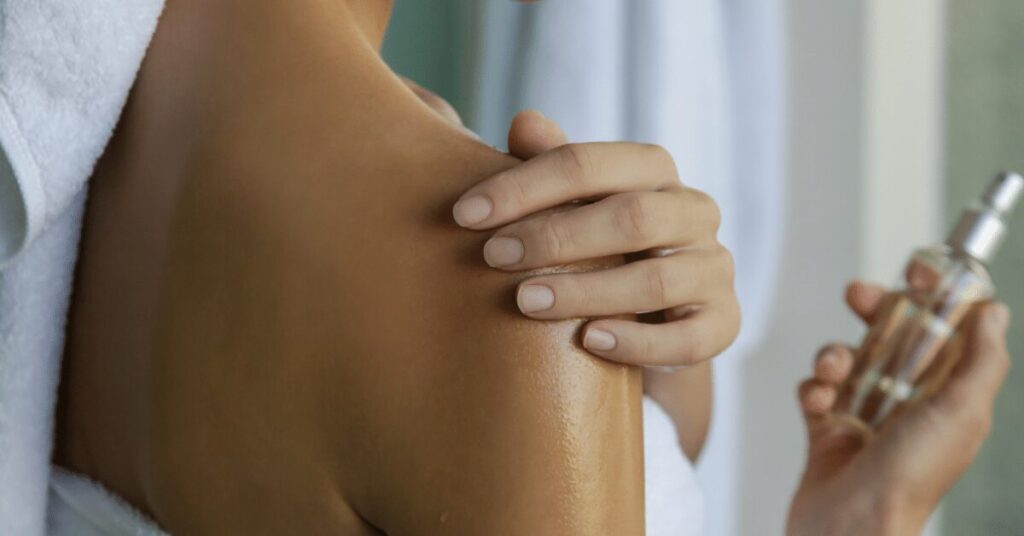This article will be your companion in conquering common dry skin issues – tightness, flakiness, irritation, and itchiness. You’ll discover tips that will improve the health and appearance of your dry skin and unveil the secret to transforming your skincare routine. Gather insights from a self-care enthusiast inspired by dermatologist recommendations.
For those dealing with severe dry skin conditions like eczema, the right skincare routine can be a game-changer, bringing about life-changing relief and comfort. This guide goes beyond basic care to provide a comprehensive education on understanding and treating dry skin. Fortunately, dry skin can be improved dramatically with the right skin care routine and products.
Table of Contents
Who Gets Dry Skin?
It’s not uncommon to experience dry skin, which can lead to a sensation of tightness, itchiness, and flakiness. While anyone can develop dry skin, it tends to affect more women than men. People with different skin tones and of all ages can experience dry skin. However, certain factors can make you more prone to dry skin:
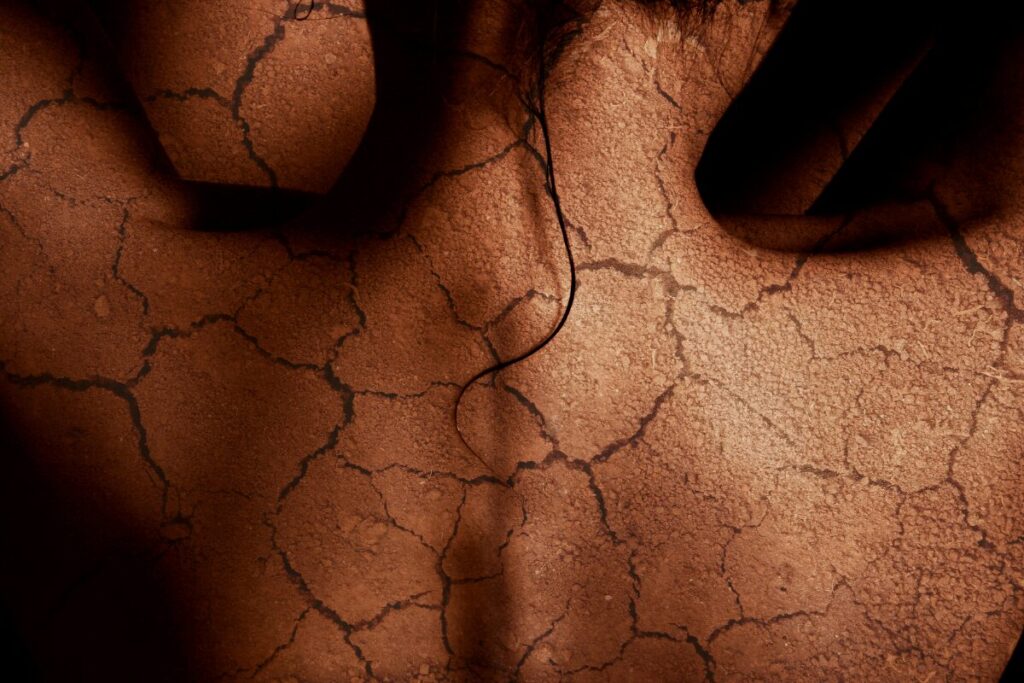
- Age – The skin tends to produce fewer oils as we age, making dryness a common issue among older adults.
- Genetics – Some people are just born with drier skin types. You may have dry skin if other family members do.
- Seasons – During the winter, cold weather tends to make the skin dry; in hot and dry climates, it can also lead to skin dehydration. As a result, many people suffer from dry skin during these times.
- Hot showers – Long, hot showers remove the skin’s protective oils, leading to dryness.
- Harsh soaps – Soaps with fragrances and harsh detergents strip away natural oils.
- Medications – Certain medications, like acne treatments, can make the skin drier.
- Skin conditions – Eczema, psoriasis, and diabetes can contribute to dry, flaky skin.
Signs and Symptoms of Dry Skin
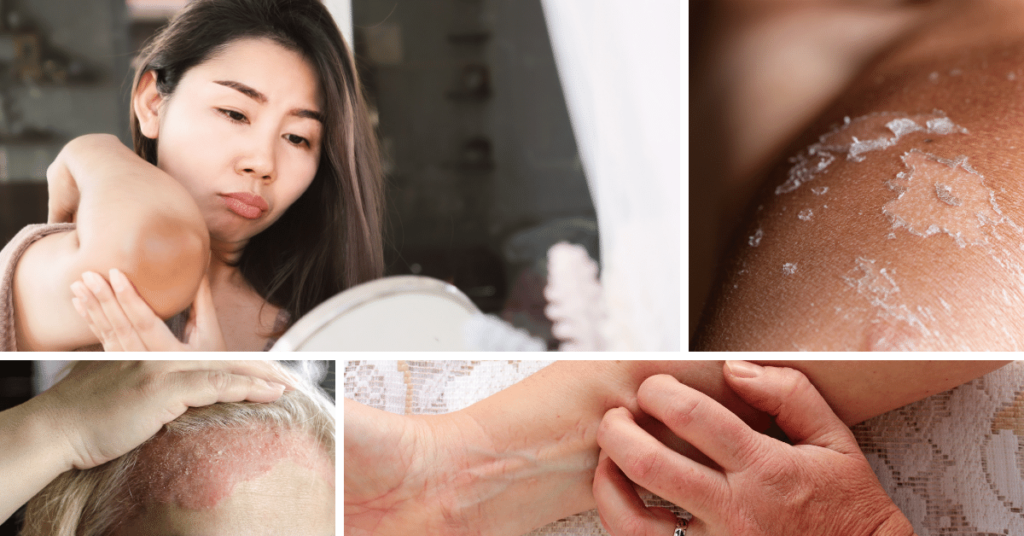
How do you know if you have dry skin? Here are some of the most common symptoms:
- Flakiness, peeling, cracks, or red patches
- Rough, dry texture
- Itchiness
- Tight feeling, especially after bathing
- Dull complexion
- Fine lines and wrinkles
- Irritation, redness, inflammation
You may experience dry skin all over or only in certain areas like your hands, legs, face, or lips. Pay attention to when your skin feels tight, flaky, or itchy, as these are clues you need more moisture.
Causes of Dry Skin
So, what causes the skin to become excessively dry in the first place? Here are some of the main reasons:
Physical Lack of Oil and Moisture
Dry skin occurs when the epidermis, or the top layer of the skin, lacks sufficient moisture. This layer contains a protein called keratin, which helps the skin retain moisture and natural oils. When you have dry skin, the keratin levels are lower than normal.
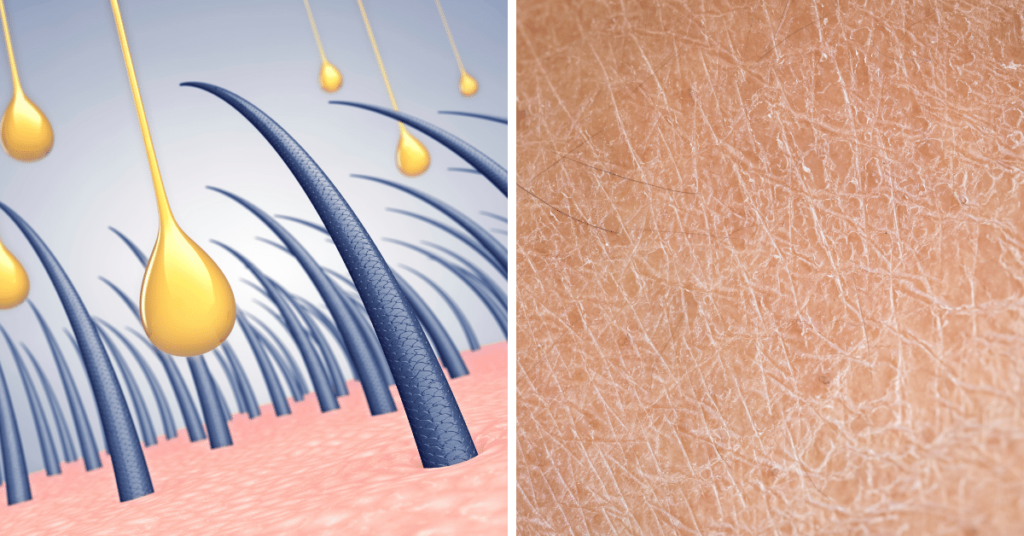
Your body has sebaceous glands that generate an oil-like substance known as sebum in your skin. The sebum acts as a protective barrier to keep moisture in. However, when there is low sebum production, moisture evaporates from the skin quickly, resulting in dryness.
Harsh Products and Ingredients
Many skin care products and ingredients can rob the skin of moisture:
- Soaps and cleansers – Especially bar soaps and cleansers containing sulfates or fragrances, which are drying and harsh.
- Alcohol-based products – Toners and acne treatments with a high alcohol content can dehydrate the skin.
- Exfoliants – Over-exfoliating removes too many dead skin cells, causing irritation.
- Retinol – Vitamin A derivatives like retinol increase skin cell turnover, which can initially cause dryness.
Environmental Factors
The environment plays a major role in dry skin:

- Cold, dry air – Low humidity in the winter sucks moisture from the skin. Indoor heat also dries the air.
- Wind and sun exposure – UV rays break down collagen, leading to dryness. Wind can chap the skin.
- Hard water – Water with a high mineral content can deposit those minerals on the skin, making it feel tighter.
- Long, hot showers – Hot water removes healthy oils faster, leading to drier skin.
Health Conditions
Certain health conditions are linked to dry skin, including:
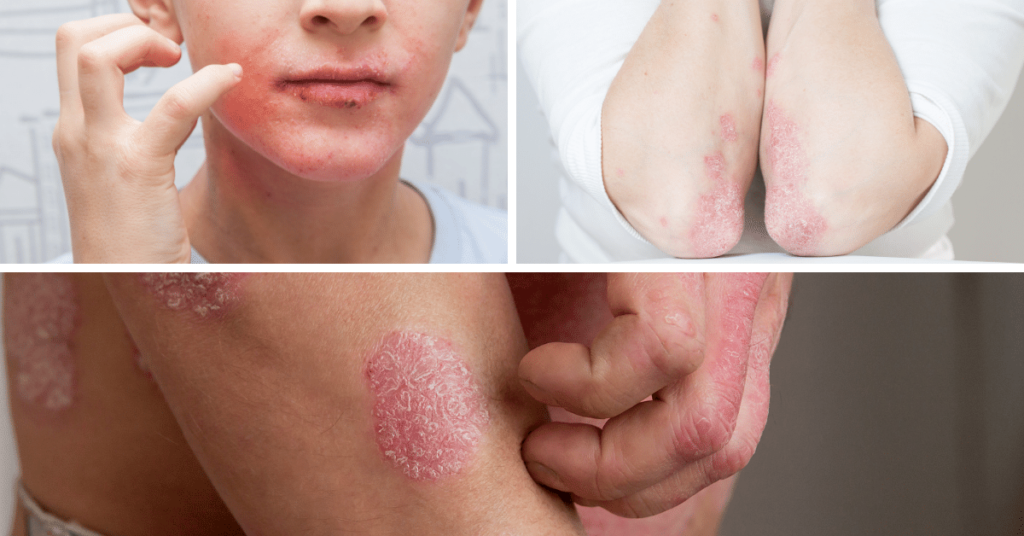
- Eczema – a condition that causes skin inflammation and irritation
- Psoriasis – a chronic autoimmune condition – the condition causes flaky, scaly patches
- Hypothyroidism – when the thyroid is underactive, it can lead to dry skin
- Diabetes – high blood sugar levels can dehydrate the entire body, including the skin
- Malnutrition – deficiencies in healthy fats and vitamins can contribute to dry skin
- Kidney disease – the kidneys help regulate fluid balance. Dry skin can be a sign of kidney malfunction.
Skin Care Tips for Dry Skin
Caring for dry skin properly is essential to improving its appearance and texture. Here are some tips to help care for your dry skin:

1. Cleanse Gently
Avoid harsh soaps, scrubs, and rubbing. These strip natural oils. Instead:
- Use gentle, creamy cleansers without sulfates or fragrance.
- Try Cerave, Cetaphil, or Vanicream cleansers.
- Rinse with lukewarm water and pat partly dry.
- Or use cleansing oils like Palmer’s or Bioderma to retain moisture.
2. Exfoliate – But Not Too Much
Some exfoliation helps dry skin by removing dead cells that cause flaking and roughness. But over-exfoliating creates irritation that worsens dryness.
- Use a chemical exfoliant 1-2 times weekly, like lactic or glycolic acid. Start with lower concentrations, like 5%, to avoid redness.
- Or try a gentler physical scrub using ingredients like oats or sugar once a week. Avoid using solid ground items like beads or shells, as these have been shown to cause micro-tears in the skin.
3. Hydrate With Toner

Contrary to popular belief, many toners can help dry skin instead of stripping it.
Look for hydrating toners with ingredients like:
- Hyaluronic acid
- Glycerin
- Aloe vera
- Rosewater
Avoid toners with alcohol, which will dry you out further. Gently apply toner to the face and neck after cleansing.
4. Serum It Up
Serums provide concentrated doses of nourishing ingredients. For dry skin, look for these ingredients in a serum:
- Hyaluronic acid – Attracts moisture to the skin
- Ceramides – Repair the skin barrier
- Vitamin E – Protects against moisture loss
- Retinol – Increases new cell turnover
To begin with, you can apply a small amount of serum, specifically 2-3 drops, on your face and neck. Make sure to wait until it is completely absorbed before moving on to applying other products.
5. Slather On Moisturizer
Moisturizer is a dry skin savior. For best results:
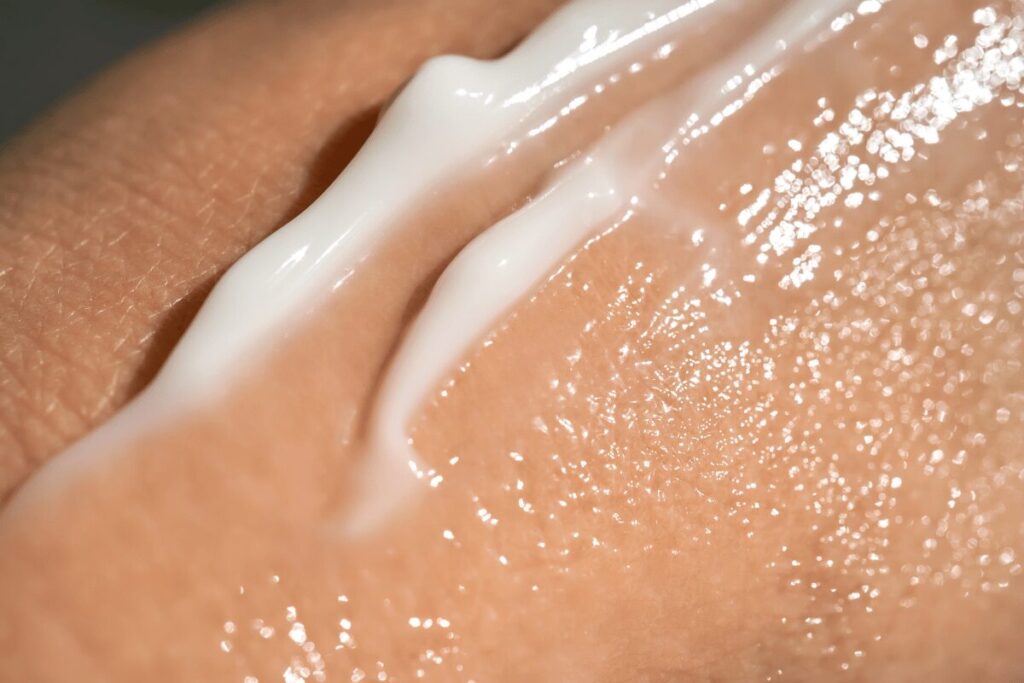
- To lock in moisture, apply moisturizer on damp skin within 3 minutes of showering or washing your face.
- Use moisturizers marketed as “creams” instead of lotions, which are lighter. Creams contain more oils and butter to nourish dry skin.
- Look for these ingredients: Ceramides, shea butter, hyaluronic acid, squalane, and glycerin.
- Apply a heavier night cream before bed to repair skin overnight.
6. Don’t Forget SPF
Sun exposure worsens dry skin. Apply a broad spectrum SPF 30 sunscreen every morning, even in winter.
For dry skin, use a moisturizing sunscreen with hydrating oils and butter. Reapply every 2 hours when outdoors.
7. Drink Up
To maintain healthy and supple skin – it is important to keep your body hydrated. Drink at least 64 ounces of water daily, and limit your intake of caffeine and alcohol, which can dehydrate your skin. Additionally, consuming hydrating fruits and vegetables like cucumbers, watermelon, grapes, and oranges can boost your skin’s moisture.
8. Add Facial Oil
Facial oils are super emollients that intensely hydrate. They also form an extra protective barrier to seal in moisture.
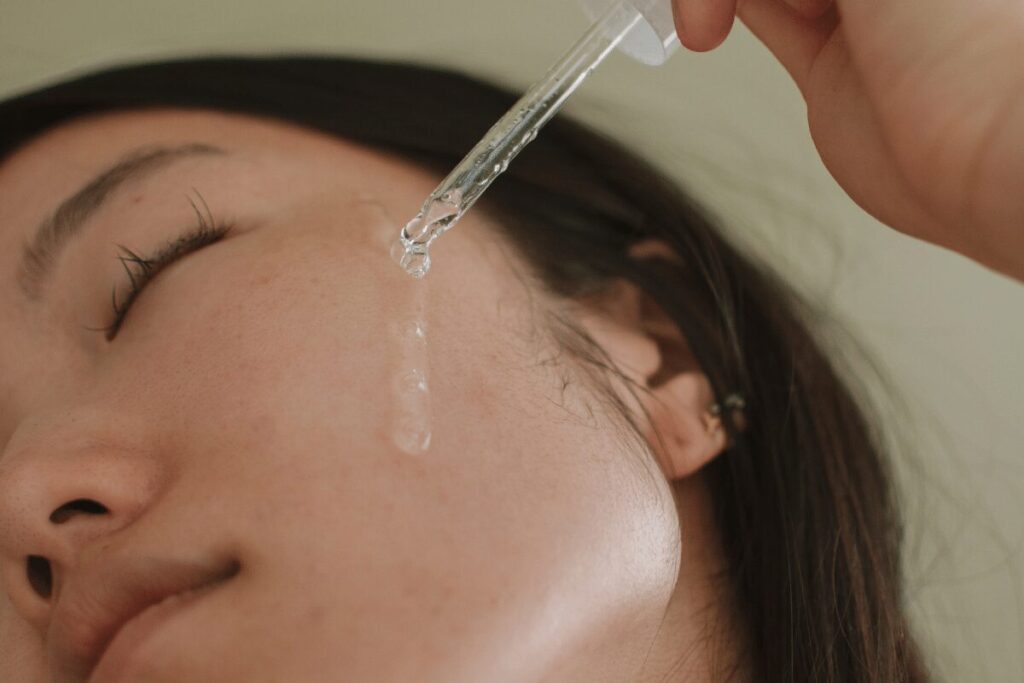
Use a few drops before bed over your moisturizer. Try argan, jojoba, olive, rose hip seed, or marula oils.
9. Use A Humidifier
Consider keeping a humidifier in your bedroom while you sleep to increase the moisture level in the air – this can help prevent excessive skin dehydration.
Aim to keep humidity around 30-50%—also, place hydrating house plants around your home.
10. Wear Gloves for Wet Work
Wear gloves when washing dishes or cleaning with chemicals to protect your hands from excess dryness.
Cotton gloves also help seal in moisture after applying creams or oils.
Lifestyle Tips for Dry Skin
In addition to a solid skin care routine, lifestyle habits greatly impact dry skin. Follow these tips:
- Limit bath time – Take 5-10 minute showers using lukewarm water. Limit baths to once a week.
- Avoid irritants – Steer clear of products with dyes, fragrances, and alcohol that aggravate dry skin. Stick to fragrance-free laundry detergent and fabric softener as well.
- Manage stress – Stress causes inflammation that can worsen dry skin conditions like eczema or psoriasis. Practice self-care through meditation, exercise, or speaking with a therapist.
- Quit smoking – Smoking restricts blood vessels, reducing blood flow to the skin; this slows cell turnover, leading to dryness.
- Eat healthy fats – Omega-3s found in fish, avocados, olive oil, nuts, and seeds nourish the skin.
- Stay warm – Bundle up in cold weather to protect your skin from harsh winds. Wear gloves, hats, and scarves, and moisturize before going outside.
- Use a bedroom humidifier – Having a humidifier run at night helps replenish moisture as you sleep.
- Check medications – If dry skin starts after beginning a new medication, talk to your doctor about potential side effects.
Specialized Skin Care for Dry Skin Types
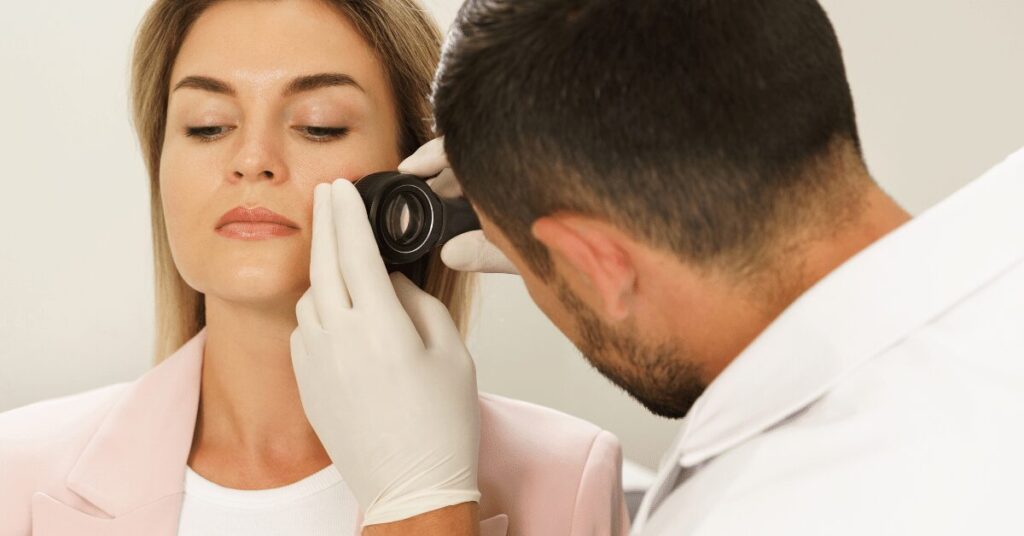
Those with certain conditions like eczema require more tailored skin care. Always talk to your dermatologist about products suitable for your specific skin needs. Here are some tips:
Eczema – Avoid triggers like scented products. Use thick eczema-friendly creams and ointments containing colloidal oatmeal.
Psoriasis – Gently exfoliate with a soft washcloth to remove scales. Use thick moisturizers and medicated creams with salicylic acid to soften plaques.
Acne-prone – Look for oil-free moisturizers, cleansers with salicylic acid, and spot treatments with benzoyl peroxide. Avoid heavy creams that clog pores.
Sensitive skin – Stick to fragrance-free and sulfate-free products. Choose soothing ingredients like niacinamide, aloe, chamomile, calendula, and green tea.
Mature skin – As we age, skin loses collagen and elasticity, appearing thinner and drier. Use antioxidant serums with vitamin C and peptides to improve tone and texture.
When to See a Dermatologist
If you’ve tried implementing a solid skin care routine, but your dry skin persists, it may be time to see a dermatologist. Signs your dry skin may require medical treatment:
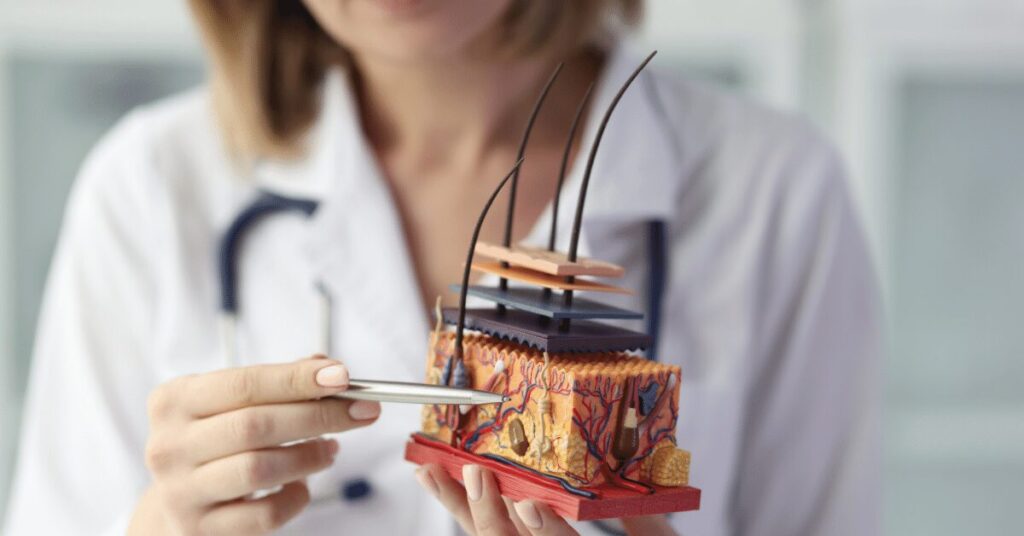
- Cracking, bleeding, or peeling skin
- Red, inflamed patches
- Itching that disrupts sleep
- Suspected allergic reaction or eczema
- No improvement with over-the-counter lotions
- Dry skin related to an underlying condition
A dermatologist has access to prescription-strength moisturizers and can rule out other skin disorders. Some common dry skin prescription treatments include:
- Corticosteroids – Reduce inflammation and itching. Used for short-term relief.
- Calcineurin inhibitors – Help control inflammatory conditions like eczema when steroids aren’t advised.
- Retinoids – Increase cell turnover and collagen production.
- Biologics – Target overactive immune responses in conditions like psoriasis.
- Oral medications – Treat underlying conditions causing dry skin, like infection or kidney disease.
Takeaway

Dry skin can be managed successfully with consistent skin care habits, the right products, and occasional professional guidance. Don’t hesitate to see a doctor if you need more intensive moisture and treatment.
Live Your Life & Love It!!
FAQs
What is a good skincare routine for dry skin?
For dry skin, cleanse gently, apply alcohol-free toners and serums, use thick moisturizers and creams, exfoliate moderately, and always wear SPF. Focus on hydrating, nourishing products.
What is the best thing to put on dry skin?
Thick moisturizing creams containing ceramides, shea butter, hyaluronic acid, and oils best hydrate and nourish dry skin.
What are the beauty tips for dry skin?
-Beauty tips include:
-Using gentle cleansers.
-Hyaluronic acid serums.
-Moisturizing makeup primers.
-Oil-based lip balms.
-Avoiding toners with alcohol.
-Applying night creams before bed.
How can I hydrate my skin naturally?
Eat hydrating fruits and veggies, drink lots of water, use a humidifier, apply natural oils like coconut and olive oil, and take shorter showers in lukewarm water.
What is dry skin a symptom of?
Dry skin can manifest as a symptom of various conditions, including eczema, psoriasis, hypothyroidism, malnutrition, diabetes, and kidney disease. It is advisable to consult with a healthcare professional if dry skin persists. Factors such as aging, genetics, harsh environmental conditions, hot showers, certain medications, and exposure to harsh skincare products can also contribute to dry skin. Seeking medical guidance is recommended for a comprehensive understanding and appropriate management of persistent dry skin.
What vitamin deficiency causes dry skin?
Deficiencies in vitamins A, D, E, and certain B vitamins can contribute to dry, flaky skin. Supplements or vitamin-rich foods may help.
How do you get rid of dry skin fast?
Use intensely hydrating masks, avoid hot showers, apply a thick ointment like petroleum jelly before bed, and drink more water to remove dry skin quickly.
What triggers dry skin?
Dry air, cold weather, harsh soaps, hot showers, indoor heat, sun exposure, and aging are common triggers for dry skin.
How can I moisturize my skin naturally?
Natural ways to moisturize include using aloe vera gel, coconut oil, honey masks, oatmeal baths, drinking water, and eating foods with healthy fats.
Related Article: Healthy Skin: Essential Nutrients for a Strong Skin Barrier
Medical Disclaimer
The information provided in this article is for educational and informational purposes only. It is not a substitute for professional medical advice, diagnosis, or treatment. Always seek the advice of your physician or another qualified health provider with any questions you may have regarding a medical condition. Never disregard professional medical advice or delay seeking it because of something you have read in this article.
The authors and publishers of this article are not medical professionals, and the content herein is based on general knowledge and recommendations. Individual responses to skincare routines can vary, and what works for one person may not work for another.
If you have a medical condition or specific concerns about your skin, it is crucial to consult with a dermatologist or healthcare professional for personalized advice and treatment. The authors and publishers do not endorse any specific products or treatments mentioned in this article.
Reliance on any information this article provides is solely at your own risk. The authors and publishers disclaim any responsibility for any adverse effects resulting directly or indirectly from the information provided.

